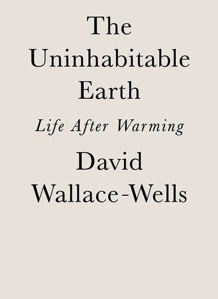By Juniper Locilento (October 7, 2019)
The Uninhabitable Earth: Life After Warming by David Wallace-Wells, Tim Duggan Books (Feb. 19 2019), February 19, 2019, 320 pp, $30.90
Climate anxiety is real.
As I’ve been reading David Wallace-Wells’ The Uninhabitable Earth these past few weeks, I found myself falling into a funk, questioning all of my individual choices and wondering about their implications.
I had been looking forward to this book because I wanted context for this mess we are in. It’s a dense work—220 pages of text with over 70 pages of notes—and was not easy going. The book starts with “it is worse, much worse, than you think” and halfway through, the author commends the “brave readers” for making it that far.
The first section, Elements of Chaos, offers a litany of disasters, with chapters titled Heat Death, Plagues of Warming and Economic Collapse, to name just a few. I was utterly overwhelmed by the predictions (at this rate of warming, under these conditions, this effect is likely); the numbers swam before my eyes and I couldn’t wrap my brain around the scenarios that will likely lead to the extinction of our species.
My pencil wore to a nub from furious underlining, but I was more confused than ever. Explanations of what has already occurred were somewhat more useful; ultimately, I decided that a listicle was the only way to go.
Herewith, 10 Things I learned about Climate Change (or what kept me tossing and turning as I contemplated the death of the planet and fallacy of recycling):
- “At four degrees of warming, the deadly European heat wave of 2003, which killed as many as 2,000 people a day, will become a normal summer.”
- Everything is junk food: “Since 1950, much of the good stuff in the plants we grow – protein, calcium, iron, vitamin C… – has declined by as much as one-third.”
- “Every year, the average America emits enough carbon to melt 10,000 tons of ice in the Antarctic ice sheets.”
- Louisiana is already being “swallowed by the sea, losing a “football field of land every single hour.”
- “As soon as 2030, global water demand is expected to outstrip supply by 40 percent.”
- In 2017, breathing the air in Delhi was “the equivalent of smoking more than two packs of cigarettes a day (p.103) with “95% of the world’s population [already] breathing dangerously polluted air.”
- “In one square mile of water in Toronto, 3.4 million microplastics particles were recently trawled…with global plastic production expected to triple by 2050, there will be more plastic in the ocean than fish.”
- “Each increase of a single degree Celsius in monthly temperature is associated with [a two percentage point rise of the suicide rate in Mexico].”
- Twenty-two percent of the world’s landmass was altered by humans just between 1992 and 2015.”
- “More than half of the carbon exhaled into the atmosphere by the burning of fossil fuels has been emitted in just the past three decades.” That is, as Wallace-Wells points out, since the premiere of Seinfeld. I was in high school in the early nineties and I remember doing a project on climate change, pasting articles into a scrapbook that said, “if we don’t act now, the planet is doomed.” It seemed like hyperbole.
Can we all agree that capitalism and climate change are inextricably linked?
All of the “progress” that we laud has resulted in the degradation of the planet to the degree that saving it is highly unlikely. Fredric Jameson is quoted as saying “it is easier to imagine the end of the world than to imagine the end of capitalism (p.161) but Wallace-Wells suggests that capitalism is endangered by climate. I’m not sure I believe him, given the trajectory that we have been on.
Greta Thunberg’s “fairytale of unending economic growth” echoes in my head.
The great flaw of humanity is our hubris, our belief that we deserve more and more and more, and that the natural world is ours for the taking. Evidence suggests that it is the industrialization of India and China that will ultimately determine our climate fate, but they are only walking in the footsteps of the West. We like to think we are the smartest species to have ever roamed the planet Earth, but the actions and consequences outlined in this book strongly suggest otherwise.
Wallace-Wells also says that,
“The climate calculus is such that individual lifestyle choices do not add up to much, unless they are scaled by politics.”
So, sure, drive less and fly less and reduce your consumption of animal proteins, but more importantly, vote in the upcoming federal election for the party that will be most effective in reducing our dependence on fossil fuels. And beyond that, ponder what it will be like to live in a post-capitalist society that puts the planet before economic progress.
After this sobering read, it’s the only path I can make out through the smog-choked air.
(Juniper Locilento, MPNL, CFRE is Senior Director, Development at the YMCA of Greater Toronto, serves as Vice President of Public Affairs, AFP Greater Toronto Chapter, and is a lecturer in the Fundraising Management Program at Ryerson University’s Chang School.)
